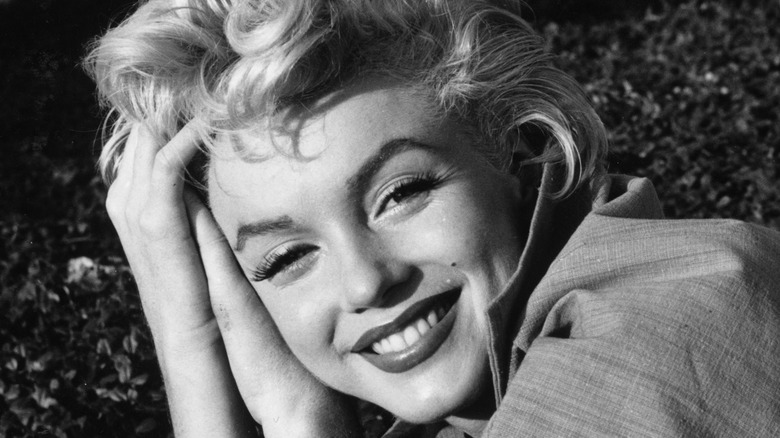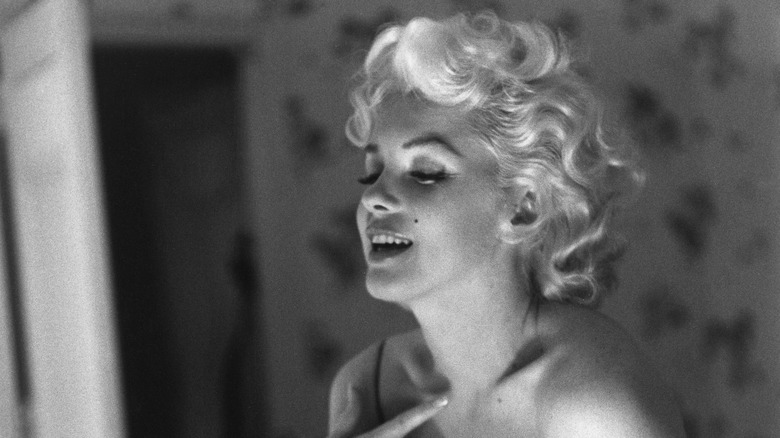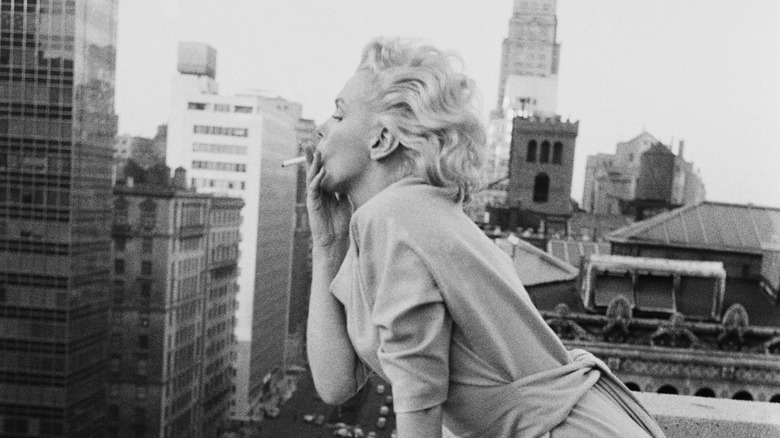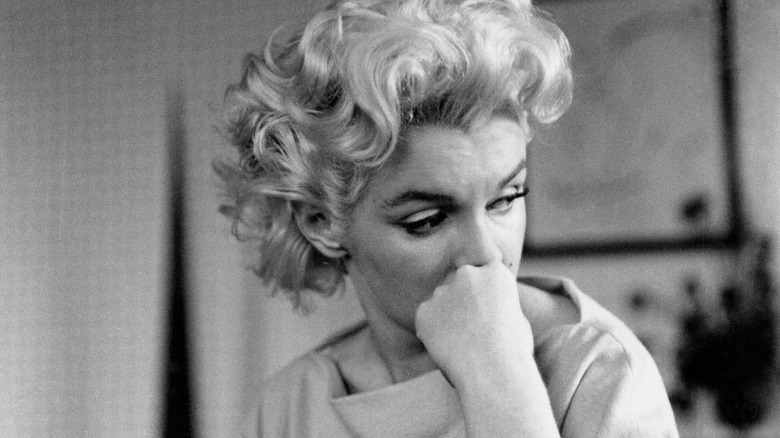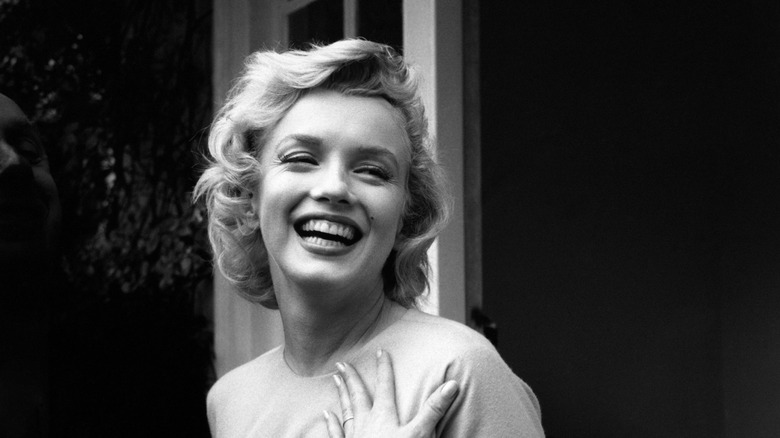Marilyn Monroe's Final Words Are Beyond Heartbreaking
We may receive a commission on purchases made from links.
The story of Marilyn Monroe's life usually starts with her death. Most people haven't seen a movie she's been in, but they know the way she sang "Happy Birthday" to former president John F. Kennedy – and they know how she died. The obituary in the Los Angeles Times from August 6, 1962 lays out the general facts ubiquitous with Monroe's image: "a troubled beauty who failed to find happiness as Hollywood's brightest star, was discovered dead in her Brentwood home of an apartment overdose of sleeping pills Sunday."
But the reason the mythology of Monroe even exists is because of who she had been when she was alive. Men and women both were dazzled by Monroe's charm and acting chops. Director John Huston of "The Misfits" fame told journalist Anthony Summers there was more to Monroe than sex appeal. "Women felt just the same as men. There was something deeply moving about Marilyn, always" (via E! Online). In her short career that lasted from 1947 — where she played a waitress in the movie "Dangerous Years" — to "Something's Got to Give" in 1962, Monroe racked up a total of 33 acting credits, per IMDb.
Being an actress is what Monroe wanted to be known for. In an audio recording, E! Online reports Monroe saying that she'd "like to be a good actress, a true actress. An artist, with integrity." For as many lines as Monroe spoke over the years, however, none have caused more mystery than her last words.
What were Marilyn Monroe's final words?
You can't understand Marilyn Monroe's death without first understanding her love life and who she was involved in before her passing. Over her short life, Monroe had a small series of high-profile relationships that included men who were legends in their own right, like baseball player Joe DiMaggio and playwright Arthur Miller. But the scandal around Monroe's marriages pales in comparison with the time she spent with former president John F. Kennedy and his brother, former attorney general Robert F. Kennedy.
Monroe's relationships with JFK and RFK are the entanglements that launched a thousand conspiracy theories surrounding her death — theories that journalist Anthony Summers investigated for "Goddess: The Secret Lives of Marilyn Monroe" and discussed in the 2022 Netflix documentary, "The Mystery of Monroe: The Unheard Tapes." In both, Summers argues that it was her relationship with the brothers that led directly to her death.
In "Deaths That Shocked the World," Time-Life claims it was JFK's brother-in-law, Peter Lawford, that Monroe last spoke to before she died. Locked in her bedroom, she took a call from Lawford around 8 p.m. PST. He had intended on inviting her to a party that night, but she turned it down. According to Lawford, the movie star had sounded "drugged" and ended the call with a chilling goodbye. Not only did Monroe ask Lawford to tell his wife goodbye, but also said, "Say goodbye to the president, and say goodbye to yourself, because you're a nice guy."
What Marilyn Monroe's final hours really looked like
Recently released reporting done by Anthony Summers shows that the timeline for Marilyn Monroe's death isn't what we were all told it was, including her final words.
In the obituary from August 6, 1962, The New York Times write that it was around 3:25 a.m. when Monroe's housekeeper, Eunice Murray, noticed a bedroom light was still on in the star's bedroom. However, according to an article Summers wrote for Vanity Fair, things started spiraling for Monroe long before then.
Earlier in the evening on August 5, 1962, Monroe was visited by her longtime psychiatrist, Dr. Ralph Greenson, who would stay with the actress until around 7 p.m. when he left for dinner. Summers' reporting doesn't include the call with Peter Lawford, but does say she spoke with notable dressmaker Henry Rosenfeld "between 8 and 9 that evening" and then with Sydney Guilaroff at 9:30.
Summers reports Guilaroff wrote in his autobiography that Monroe "telephoned [him] in despair" that night, rambling "about being surrounded by danger, about betrayals by 'men in high places,' about clandestine love affairs" (via Vanity Fair). It was also in that phone call that Monroe revealed it wasn't just her doctor who visited her that day. Robert F. Kennedy, she'd told Guilaroff, had visited her earlier that day — "threatening" and "yelling at" her. According to Monroe, Kennedy had promised to marry her one day, but had come to her house that day to break things off.
Did the mafia kill Marilyn Monroe?
The autopsy report released following Marilyn Monroe's death ruled the cause as "probably suicide." The lack of a definite cause fueled conspiracy theorist fire, leaving room for assassination attempts that lead back to Jimmy Hoffa, Sam Giancana, and the mafia. In her book "The Secret Letters," The Scotsman reports Wendy Leigh argues it was these men who killed Monroe via enema injection. Leigh's claim — dismissing the reporting Anthony Summers has done — is even backed by John Miner, who was present for Monroe's autopsy.
Leigh's theory begins with Joe Kennedy, father to John and Robert, who had partnered with Frank Costello, "notorious mafia boss," per The Scotsman. These connections helped Joe secure John's vote during his presidential run, with the Cosa Nostra allegedly being called upon to help "buy votes." But when Robert became the attorney general in his brother's presidential administration, the Kennedy relationship with the mafia quickly turned. Robert's mission to end organized crime was getting in Hoffa's way.
While this all sounds too good to be true, Summers reveals in his piece for Vanity Fair that the mafia and FBI were actually both interested in Monroe because of her connection to the Kennedy brothers. Monroe's house had been bugged by Hoffa and the government, and the mafia both were curious about what the Kennedys might be telling their mistress. But evidence does not support a theory that anyone else other than Monroe had a direct hand in her death.
Marilyn Monroe didn't leave a suicide note
There are too many conflicting accounts to ever know for sure the when's and how's of Marilyn Monroe's death, which is a major reason why the mystery of her death endures. For many of us, we all thought we knew the official timeline of Monroe's death until we watched Netflix's "The Mystery of Monroe: The Unheard Tapes" or couldn't conceptualize the realities of living with a schizophrenic mother until they read Joyce Carol Oates' novel, "Blonde."
All we have to try and fill in the mystery of Monroe's death are pieces of conversations she had in the hours before her death, which are their own form of a note. Not only did she tell Peter Lawford goodbye, but she told her psychiatrist, Dr. Ralph Greenson, she was "feeling rejected by some of the people she had been close to" after plans to see a "very important person" — one of the "extremely important men in government" she'd been having a relationship with — were abruptly canceled, per Vanity Fair.
With evidence placing former attorney general Robert F. Kennedy in Los Angeles that day — and an audio recording of his alleged last visit — it's easy to see the dominoes being lined up for Monroe's downfall. What Dr. Greenson said was probably true; Monroe was a heartbroken, lonely woman, idolized by all, but truly loved — truly known — by no one.
